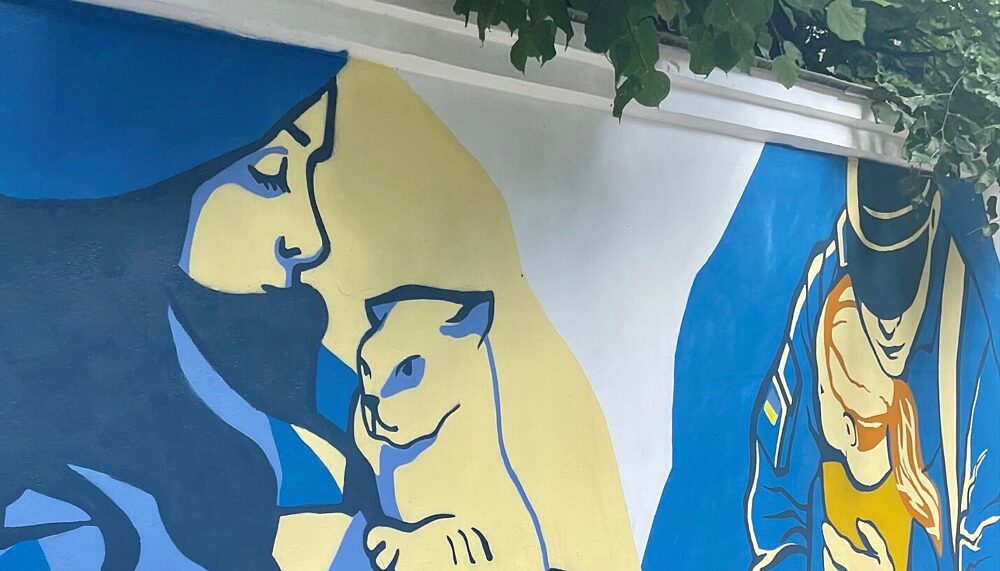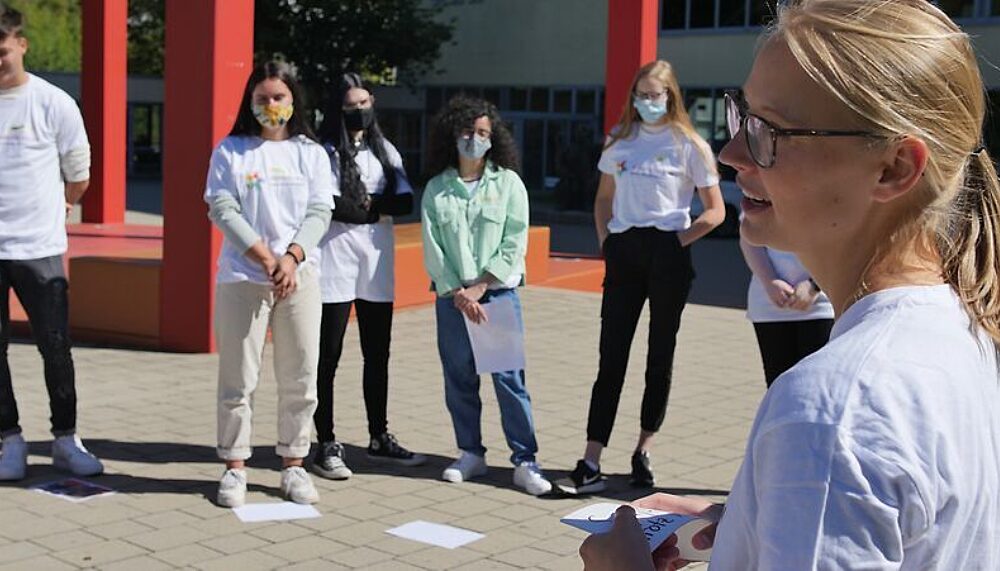BLOG POST | 20 Dec 2022
Divided or united?
The impact of war on Ukrainian national identity

Our consultant Mariia Levchenko interviewed civil society activists across Ukraine on the impact of war on Ukrainian national identity.
By Mariia Levchenko
For many years, I have studied wars and conflicts and how to resolve them through dialogue. Yet as a Ukrainian, my experience of war has become much more personal in the past year. I witnessed how wars change the fabric of the national identity of a country as I travelled across Ukraine conducting interviews for the Berghof Foundation and assessing the needs and challenges of local civil society activists.
While I worked on the scoping study, the situation on the ground in Ukraine was constantly changing. From the main frontlines, the battles moved to the destruction of civilian infrastructure and electrical plants. During my trip to Ukraine in November, I witnessed Russian missile attacks and experienced how it feels to live with just three hours of electricity per day, with no heat and no proper mobile connection. These are the realities that Ukrainians have to live with every day. In some Ukrainian cities, having electricity at all is considered a luxury.
I witnessed how wars change the fabric of national identity of a country as I travelled across Ukraine conducting interviews with local civil society activists.
Nevertheless, despite the constant struggle, Ukrainians are ready to continue their fight. Identity plays a significant role as a motivator. They feel that with the start of the full-scale invasion in February 2022, Ukraine became not only the centre of a geopolitical conflict, but also a place where universal values, such as democracy, human rights, and the rule of law, are at stake. The atrocities in Bucha and Irpin, the constant targeting of civilians, and the documented war crimes in newly liberated territories, has introduced a fierce national identity element to the war. Ukrainians are fighting for survival as a nation. As one interviewee in Lviv told me: “I am furious. My whole identity is protesting and screaming to the world. There is endless surprise and misunderstanding. All this wild violence seems like such a strange experience. It’s 2022, and everything has been reset to survival and killing the enemy”.
In Ukraine, language, ethnicity, and historical memory have long divided the country since it first gained independence in 1991. To this day, Ukrainians continue to deal with many divisive discourses that create tensions in communities and sometimes lead to local conflicts. In addition, during the eight years since the occupation of Crimea, Donetsk, and Luhansk oblasts, there have been few opportunities for engaging local civil societies in dialogue processes or providing space to discuss and acknowledge the complexities of Ukrainian identity. The lack of interaction and communication at different levels has widened the political, economic, social, cultural, and mental gaps between government and non government-controlled areas.
During the past eight years, there have been few opportunities for providing space to discuss the complexities of Ukrainian identity.
However, during my trips through Ukraine in the past year, I have noticed a change. I have observed the awakening of a common national identity, the acceptance of new identity markers and an understanding that the whole community is in the process of rethinking itself and its belonging. As one interviewee put it: “Right after the war started, I felt myself drawn into feeling 100% Ukrainian. I felt the desire to stand up and fight for our independence. There is no doubt anymore about whether we are Ukrainians or not. We all are. Our identity has manifested itself and blossomed.”
The extraordinary levels of solidarity among Ukrainians both in and outside the country demonstrate the unity Ukrainians everywhere have in feeling this new, strong national identity. Examples of this are plentiful: a woman in Kherson, secretly leading a partisan movement at the risk of being exposed and tortured; young people delivering humanitarian aid and serving as immediate first responders in the occupied territories, with no external support or protection; women refugees organising mass rallies across the world.
At the same time, certain historical and geopolitical orientations have lost their importance. This trend complements the strong sense of solidarity and feeling of national identity. Ukrainians have always felt divided by geographical lines – East or West – or by which language they speak – Russian or Ukrainian. But now, the historical memory of belonging to the Soviet Union and its legacy has ceased to be just a register of events and figures that act as markers of “us-them”. It has become a set of symbols that represent specific values and ideals. However, the question remains relevant: how can people with multiple identities from across Ukraine come together in the long term? How can a society torn apart by war and impacted by trauma be supported, which will require a long healing process?
How can a society torn apart by war and impacted by trauma be supported, which will require a long healing process?
The national Ukrainian identity cannot be based on hatred and vengeance, and this cannot be passed on to future generations.
During my many interviews and consultations with civil society representatives on the ground, it became evident that there is an urgent need for strategies to resist aggression and pave the way for future processes of reconciliation, trauma healing, the rebuilding of destroyed human relationships, and the strengthening of society’s peacebuilding potential. Their key recommendations for creating a space for future peacebuilding processes are:
- Develop a state policy of national unity with the inclusion and involvement of different groups and representatives of multiple Ukrainian identities.
- Include new voices and younger generations in order to ensure the sustainability and long-lasting effect of reconciliation, which has been a missing element in the past years of peacebuilding work in Ukraine.
- Focus on local ownership and the strengthening of local peace capacities, while supporting psycho-social and trauma care.
War is a long and arduous journey, a movement from indifference to action. It influences, shapes, and changes identities. However, the Ukrainian desire for independence has always guided Ukrainian society. The ultimate goal is not a conflict-free society, but rather competent and effective approaches to conflict resolution both within and outside the communities. The war has highlighted that it is essential to find common ground built on positive values in the ecosystem of diverse Ukrainian identities for sustainable peace among Ukrainians to take shape.
Mariia Levchenko is Peacebuilding Officer at PATRIR, McCain Institute Fellow 2022, and consultant for the Berghof Foundation and USIP. Previously, she worked as a Dialogue Facilitation Officer at the OSCE’s Special Monitoring Mission in Ukraine.
To highlight the voices of Ukrainian civil society organisations and peacebuilding initiatives and their response to the war, we interviewed civil society activists from Ukrain.
Find this series, more articles and our discussions on Ukraine here.
This article was updated on 11 January 2023 to fix some typos.
Media contact
You can reach the press team at:
+49 (0) 177 7052758
email hidden; JavaScript is required


